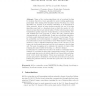148 search results - page 28 / 30 » Self-stabilization of Byzantine Protocols |
PDCAT
2009
Springer
14 years 4 months ago
2009
Springer
Abstract—Awerbuch and Scheideler have shown that peerto-peer overlays networks can survive Byzantine attacks only if malicious nodes are not able to predict what will be the topo...
DSN
2000
IEEE
14 years 2 months ago
2000
IEEE
This paper describes an experiment in formal specification and validation performed in the context of an industrial joint project. The project involved an Italian company working...
ADHOCNOW
2004
Springer
14 years 3 months ago
2004
Springer
Many ad hoc routing algorithms rely on broadcast flooding for location discovery or more generally for secure routing applications, particularly when dealing with Byzantine threat...
EUROPAR
2001
Springer
14 years 2 months ago
2001
Springer
This paper is on the construction of a server subsystem in a client/server system in an application context where the number of potential clients can be arbitrarily large. The imp...
SIES
2008
IEEE
14 years 4 months ago
2008
IEEE
—Distributed, time-triggered communication based on FlexRay is likely to become an enabler for future safety related applications in the automotive domain. Prior to series deploy...

